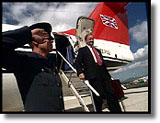
|
|
Cook: Crucial meetings
|
Guide to the Amsterdam Summit
Labour has a policy of "constructive engagement" at the Amsterdam Summit,
which will revise the Maastricht Treaty. Negotiations will be tough, and ministers have to be seen to protect national interests while achieving positive advances for Britain.
The Maastricht Treaty, which established the EU, was signed on February 7,
1992. Heads of government intend to finalize the revision, a process which started in 1996, in Amsterdam on June 17. Any delay would require a fresh summit in Luxembourg - probably in July.
The new Treaty will formalise arrangements for up to 10 more countries to join
the EU, and produce a blueprint for reform. But it will be at least a year before the Treaty can be ratified, as it has to go to referendums in countries including Ireland, France and Denmark.
All Treaty changes must be unanimous - which means any member state can veto a
change. At Maastricht, John Major was given an opt-out of the Social Chapter to
stop him exercising his veto and blocking the move.
Key Issues
- Frontier controls - Prime Minister Tony Blair's central task is to ensure
that Britain is excluded from plans which, in a bid to make the EU a single area of "freedom, security and justice", would make frontier controls a policy
regulated on an EU-wide basis rather than by nation states. Mr Blair will insist on Britain retaining control over its borders, as well as
its immigration, asylum and visa policies.
- Foreign policy and defence - The Government backs a Common Foreign and Security Policy - but not a single European policy in this area. It wants cooperation rather than centralisation. Britain also supports the idea of a "Mr CFSP" _ an official to implement the
agreement.
Labour also wants more cooperation on defence matters, but opposes EU adoption
of the Western European Union as its defence organisation, believing that is
Nato's role.
- The Single Currency - Though not strictly on the agenda, French demands that the rules governing participation in the scheme should be adjusted to prioritise jobs and growth threaten to cast a shadow over the formal agenda.
The French may refuse to sign up to the proposed rules - called the
"stability pact - which are due to be signed in Amsterdam, unless it gets
concessions.
- Employment - The Government supports inclusion of an employment chapter in
the Treaty, believing tackling unemployment should be an EU priority.
Bur Mr Blair wants to ensure that flexible Labour markets, not further costs are to the fore.
- Constitutional Matters - Ministers are pressing for the re-weighting of
votes to give larger countries such as Britain a more equitable say. They also
support plans for EU enlargement, believing the entrance of eastern European
countries will lead to greater stability.
There is wide agreement that the number of EU commissioners should remain at
20 - which would mean larger countries such as Britain losing one of their two
Commissioners when the union is enlarged.
- The Veto - Proposals to extend majority voting in Europe are a central
issue. If countries retain a veto when further states join the EU, it is felt
the voting process will become unworkable. Unlike the Tories, Labour believes that extending "co-decision" in some areas would strengthen EU democracy. But they stress that Britain must retain a veto in areas such as border control and defence. However, there is now an agreement that some change must be agreed at Amsterdam.
- Quota-hopping - The Government is determined to gain some
victory in restricting foreign trawlers' fishing in British waters. A
development is expected before or during the summit, though the issue is not
formally on the agenda. The Tories had said they would block the entire Treaty
to get a settlement.
- The Social Chapter - Labour will opt in, reversing Tory policy, though the
Chapter could take two years to implement. Britain would then be committed to regulations on two issues - parents would
have the right to three months' unpaid leave during the first eight years of a
child's life, and firms with bases in more than one EU country would have to
introduce a works council. Ministers will negotiate on future regulations.
- Transparency - Labour has said it will press for more open decision-making in Europe, and more opportunity for national Parliaments to scutinise EU matters. The role of the President of the European Commission, currently Jacques Santer, is likely to be strengthened, while enhancing the European Parliament's power will also be discussed.
|

